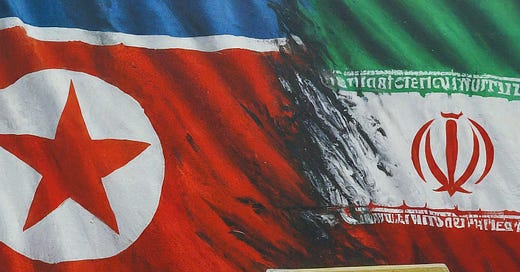Moscow veto ends work of UN PoE; Russian oil going to DPRK; US and South Korea launch joint task force
Prohibited Transactions for the week of 25 Mar 2024 (#42)
North Korea
Russia vetoed a UN Security Council (UNSC) resolution extending the mandate of the UN Panel of Experts (PoE) on North Korea’s illicit activities, meaning that their work will end on 30 April 2024. The PoE was created under UNSC Resolution 1874 (2009) and they released their first report in November 2010. The PoE’s mandate must be renewed yearly, and proposals by Russia and the PRC (see Issue #41) — which would have weakened UN sanctions and the PoE’s work — was rejected by other UNSC members and resulted in the Russian veto. A representative from a non-permanent member of the UNSC noted that the US sponsored resolution was an attempt at compromise and would have tied renewal of the mandate to broader discussions on sanctions and dialogue, and made the midterm report confidential. //This is a big victory for the Kim regime, as well as Russia and the PRC, who will now be able to act with even more impunity in evading or just outright ignoring international sanctions directed against Pyongyang. This is also an indication of the growing relationship between Moscow and Pyongyang.
Though there was a certain level of reliance on previously published open source materials (such as the great work done by RUSI and C4ADS) by the PoE, their reports stand as the most authoritative examination of North Korea’s illicit activities due to the imprimatur of the UN, as well as their reporting on information provided by member states. The appendices, in particular, contain a wealth of useful information that banks can use to identify North Korean illicit networks. If a last minute agreement cannot be reached before the end of April to save the PoE, Moscow and Pyongyang could still rue the day if all of this results in a stronger mechanism established outside of the UN to monitor the DPRK’s illicit activities.
The demise of the PoE comes as their Spring 2024 report was released. //I’ll review and cover the highlights from the report in the next issue or two.
An analysis of satellite images and open source information — jointly conducted by RUSI and the Financial Times — reveals that during March at least five North Korean oil tankers visited a port in Russia’s Far East, appeared to load up cargo, and deliver it to a North Korean port. The direct supply of Russian oil to the DPRK — likely in exchange for North Korean munitions and ballistic missiles — is a “full-frontal assault against the sanctions regime, which is now on the brink of collapse” said a former coordinator of the PoE. Regular oil deliveries to the DPRK will benefit the country’s military, weapons programs, and broader economy. //And reduce pressure on the country’s illicit networks and supply chains to have to smuggle oil into North Korea. This could also result in a change in fund flows tied to North Korean oil smugglers.
Moscow stated that there is no evidence that Pyongyang was behind a series of cyberattacks against Russian defense companies. Experts say that the DPRK may be stealing from partners such as Russia because of the compatibility with North Korea’s Soviet-era weapons.
According to covert reporting from inside North Korea, an Air Koryo flight recently arrived in Vladivostok carrying North Korean defense researchers and technicians, overseas workers, students, university professors and tourists. Reportedly, North Korea has de-prioritized sending laborers to Russia as Pyongyang’s ability to earn foreign currency is diversifying.
Two Russian government aircraft — one a large transport plane — appears to have recently flown to Pyongyang and back to Vladivostok, possibly picking up short-range ballistic missiles (SRBMs) from the DPRK.
The US and South Korea launched a bilateral Enhanced Disruption Task Force (EDTF) to counter North Korea’s illicit procurement of refined petroleum. The task force will engage in joint actions including “exposing DPRK sanctions evasion activities, reviewing options for autonomous sanctions designations, and engaging private sector and third-party actors throughout the region who facilitate — either knowingly or unwittingly — the DPRK’s oil procurement networks.” //Though banks won’t be the only private sector companies approached, it will be interesting to see exactly what asks this task force will have for financial institutions in East and Southeast Asia.
Washington and Seoul jointly sanctioned six people and two entities based in Russia, the PRC and United Arab Emirates for generating funds that went to Pyongyang’s weapons of mass destruction programs. The individuals all work overseas for North Korean banks.
--
Schools in Japan operated by the North Korean diaspora, known as the Chongryon are losing local government funding and face potential closure.
Japanese authorities warned companies about unwittingly hiring North Korean IT workers posing as Japanese citizens.
North Korea and Vietnam agreed to increase cooperation and advance their bilateral ties.
Iran
//Due to all the North Korea-related reporting and commentary this week, as well as the slowdown of news coming out of Tehran — probably due to the Persian New Year — I will resume coverage of Iran next week.



